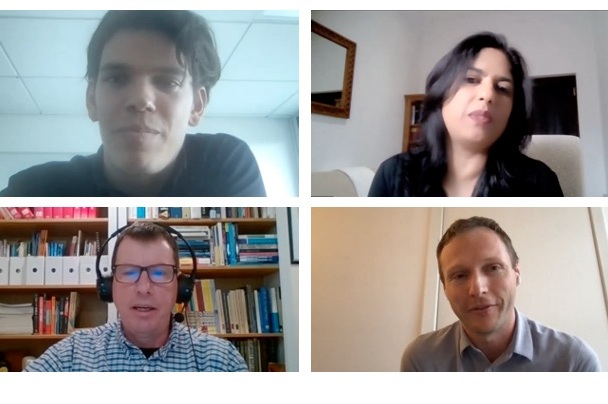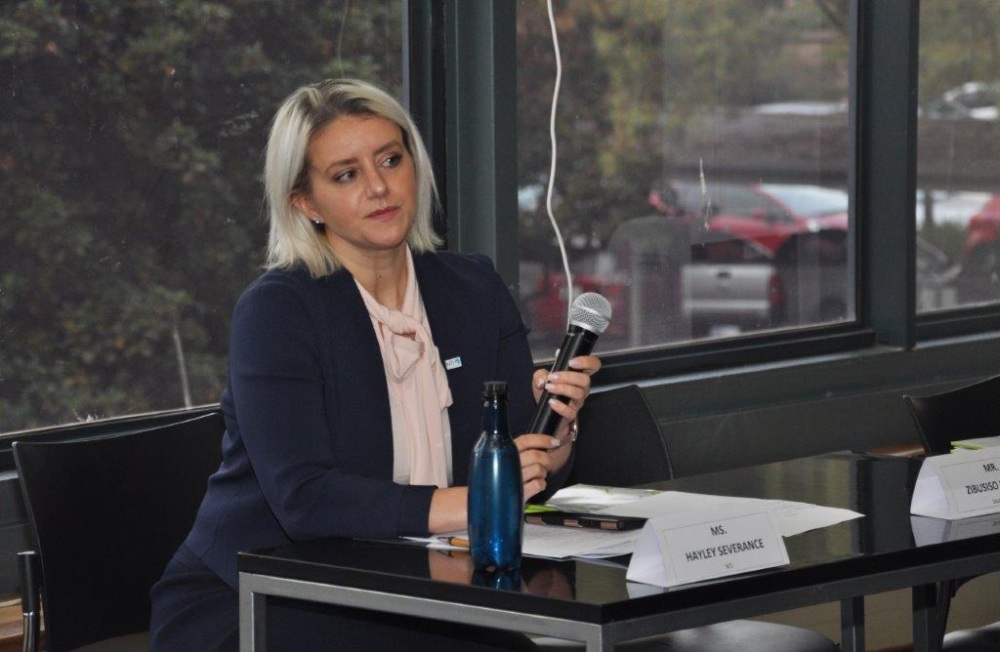
Michelle Nalabandian
Program Officer, Global Biological Policy and Programs
Atomic Pulse
This Atomic Pulse post was written by Michelle Nalabandian, a program officer with NTI | bio, and Cassidy Nelson, a research scholar at the Future of Humanity Institute.
Ebola outbreaks, pandemics, and biological weapons may sometimes
seem to be disparate topics within global health security, but they have key
factors in common: each could increase the risk of a high-consequence
biological event; all require urgent attention by health and security communities
to prevent and detect such an event and to rapidly respond; and together, they
were the basis for recent global meetings focused on preparing for high-consequence
and globally
catastrophic biological events of the future.
Health and security experts agree that the risks of a
catastrophic biological event are increasing due to factors such as rapid
advances in technology, an increasingly interconnected world with persistent
health security challenges, ongoing global insecurity and disorder, and a breakdown
in global security and scientific norms, including important norms against the
development and use of weapons of mass destruction. Despite these shared concerns,
urgent biosecurity risks are not being adequately addressed in mainstream
health and security fora.
What should health
and security communities do?
To raise the level of discourse and support the cross-sectoral
dialogue needed to address these challenges, NTI and a number of partners* brought
these issues to the mainstream security community during an event
on the margins of the 2019 Munich Security Conference and to mainstream
global health experts during a side
event at the 2019 World Health Assembly.

These events generated critical observations and
important recommendations, including through a
new report on the Munich event, about key shared priorities among the
health and security communities.
Among them:

To reduce this major risk, health and security sector
leaders should advocate for the United Nations Secretary General to create a
permanent position capable of coordinating preparedness and response activities
in the event of a deliberate or catastrophic biological event.
There also is a need for global coordination to
ensure that emergency use and scale-up of pharmaceutical and non-pharmaceutical
interventions are possible during high-consequence biological events. The Coalition for Epidemic Preparedness
Innovations, formed in 2017, serves as an example of effective
coordination for vaccine development, but expanded efforts are needed for
diagnostics and other essential elements of a public health emergency response.
It’s clear that biological security is not yet a first-tier
priority for leaders in international security or global health, and this must
change. In 2019 and 2020, there are important opportunities for security and
health leaders to demonstrate their commitment to bridging this gap, including:
dedicated interventions at the Biological Weapons Convention meetings of
experts and states parties that highlight the lack of funding and resources dedicated
to investigation and attribution of an alleged use of biological weapons; panel
discussions and/or side events at the Global Health Security Agenda ministerial
meetings focused on raising awareness about the risks posed by advances in
biotechnology; and a dedicated plenary session each year at the Munich Security
Conference that specifically focuses on biological threats from a national
security perspective.
For more on the risks and possible solutions, read NTI’s new
report: A
Spreading Plague: Lessons and Recommendations for Responding to a Deliberate
Biological Event and Wilton
Park Report: Powerful actor, high impact bio-threats.
*Partners include Future of Humanity Institute, Johns
Hopkins Center for Health Security, Georgetown University’s Center for Global
Health Science and Security, and the Center for Global Development.
Sign up for our newsletter to get the latest on nuclear and biological threats.
Aparupa Sengupta, senior program officer for NTI’s Global Biological Policy and Programs team (NTI | bio), sat down with NTI’s Mary Fulham for the latest in Atomic Pulse’s “Get to Know NTI” series.
Today, leaders preparing for the BWC’s Ninth Review Conference in August are exploring whether the global community can leverage increased attention and political will to strengthen the BWC by building mechanisms that increase transparency and trust with the goal of reducing the risk of global catastrophic biological events. A particular aim is determining whether there are effective and politically viable ways to enforce the treaty.
An epidemiologist focused on preventing catastrophic biological events and building health security capacity around the world, Hayley Anne Severance brought her expertise to NTI’s expanding biosecurity team in 2018.



